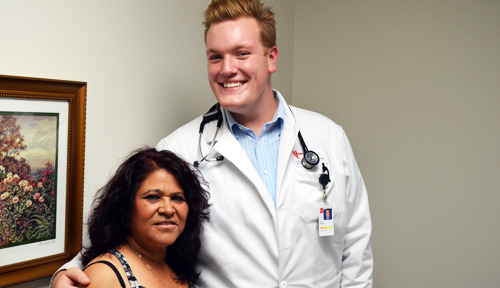Grant Turner has been treating Maria Neri for more than a year.
What makes that uncommon is that Turner is not yet a doctor — he’s a third-year medical student taking part in the SHARING Clinics continuity care program.
The SHARING Clinics allow students to provide low-cost, high-quality health care to underserved patient populations.
The continuity care program, overseen by clinic director Jim Medder, M.D., allows students like Turner to provide care to the same patient over an extended period of time — in essence becoming that patient’s primary care physician.
For more information on SHARING Clinics and the care they provide, please go to the SHARING website.
Turner has always been interested in volunteerism. As an undergraduate, he worked for two years with AmeriCorps, providing 450 service hours working with underserved populations in the small town of Storm Lake, Iowa.
At this point, most of Turner’s work was education-focused, not health-related. But when he came to medical school, he knew that volunteerism would remain important.
“SHARING really stood out to me as something that I wanted to get involved in as a medical student – and later on, as a physician,” he said.
The SHARING Clinic offers solid medical training, as well.
“One of the main tenets of SHARING is to teach students how to be outpatient clinicians by giving them their own patient, letting them learn how to independently act in a clinic environment,” he said.
SHARING also provides a specific eye into the cultural differences a physician may encounter – patients from underserved populations, low-income patients, patients from populations that suffer health disparities.
And the continuity program enhances that experience, Turner said.
“We get to delve deeper than if they get a different medical student every month,” Turner said. “This way, they really get to talk about their problems more in depth, and have fine-tuning of their health management.”
Over the course of a year, Turner’s relationship with Neri has changed.
“In the beginning it’s a little bit awkward, just like when any patient comes to see a physician for the first time,” he said. “Now, it’s a lot easier for us to talk about the things that are happening. We laugh and joke — it becomes much more of a patient-provider relationship.”
Speaking through a translator, Maria said she appreciates Turner and the SHARING Clinic.
“I feel like my health has been better,” she added.
